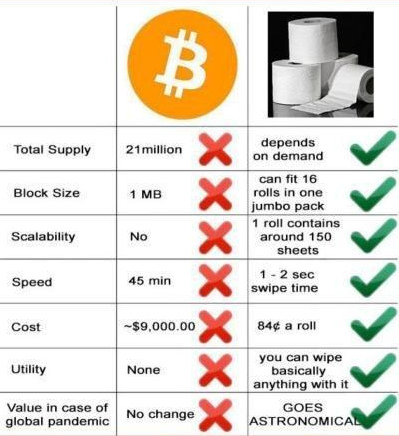- I’m enjoying the shiny new netbook, putting your valued contributions to good use — it was just the thing for this newsletter post. Even if I had to compile the wifi driver from source, because I am that sort of bloody-minded nerd.
- You’ll be 0% surprised to hear that I have no conference or panel dates lined up — perhaps I can sell video appearances …
So much for the nodding-and-smiling racket
Coronavirus Covid-19 means crypto conferences are doomed. And crypto media — looking at you here, CoinDesk — may be a casualty. [Amy Castor, Decrypt]
Decrypt has a rolling roundup of coronavirus crypto stories. [Decrypt]
TRON’s nITROn conference has been postponed, but they’re keeping all the money they can — they’re still selling tickets for this event that has no date in the foreseeable future, and they’re even offering discounts if you buy in even bigger! [nITROn screenshot]
CoinDesk’s Consensus conference is absolutely not even refunding you unless they’re forced to shut down by law, or if you’re barred from travel by your home country. [CoinDesk email, archive]
Jacob Kostecki’s Massive Adoption event is still showing no evidence of refunding people. Though it would probably have been cancelled due to coronavirus anyway. [Fintech DIrect]
To pay off his Massive Adoption ticket bill (of course), Kostecki has pivoted to real estate. He has a free ebook on wholesaling real estate, coming out in a couple of weeks! [Twitter]
Man, I bet Gerry Cotten’s wishing he’d had Coronavirus as an excuse.
my job is to write angry tweets about how the world is a corrupt hellhole full of sick people & people are too cowardly to even help each other. i want 5 litecoins
— wint but Al (closed) (@drilgpt2archive) March 10, 2020
Indian ban on cryptos struck down
Actually good news for bitcoin — the Supreme Court of India has struck down the Reserve Bank of India’s 2018 circular against cryptocurrencies, on procedural grounds. [Times of India]
Why was India so hostile to cryptos anyway? From 2018: Meet India’s biggest cryptocurrency Ponzi scheme. [Medium]
The Reserve Bank of India isn’t happy with the ruling, and are appealing it. This is unlikely to succeed — the ruling was on the basis that the Reserve Bank had not shown sufficient actual economic harm from cryptos. But they’re likely to just try to push it through harder. [Economic Times]
Tanvi Ratna has a Twitter thread and a YouTube video explaining the ruling, and what it means. It’s not at all 100% good news for crypto in India — the court’s ruling is technologically weird in a number of ways, and it’s only freedom for businesses, not retail crypto users or investors. [Twitter; YouTube]
Last chance to buy under $100k
Crypto is officially recognised by Ukraine! Ukrainian taxpayers now have to report crypto holdings. [CoinDesk]
BitMex is officially recognised by UK financial authorities! The FCA issues a warning against the exchange — they’re not licensed to deal with UK-based customers. Bitmex is “assessing the situation.” One source told The Block that the FCA may proceed similarly against other exchanges. [FCA, Decrypt, The Block]
(“FCA are like the SEC If they forgot to do their job, ever” — Ben Munster)
The Blockchain Association has put out a research report on employment trends in the “digital asset industry.” Shockingly few people work in crypto — the report puts it at about 20,000 all together. No wonder crypto media barely has an audience. [The Block]
Here’s a PwC report from 2019, about crypto hedge funds in 2018. They found 150 active firms, $1 billion total assets under management, $4.3 million median assets under management, and a median return of minus-46%. Those dollar amounts are pitifully small — the “crypto hedge fund” space was mostly HODLers putting on a tie and pretending they were big shots. [PwC, PDF]
The Bank for International Settlements, February 2019: “Beyond the Doomsday Economics of ‘Proof-of-Work’ in Cryptocurrencies” by Raphael Auer — why finality is hard in proof-of-work. This is the paper formerly known as “The mechanics of decentralised trust in Bitcoin and the block chain.” [SSRN]
UNITED STATES OF AMERICA v. 113 VIRTUAL CURRENCY ACCOUNTS. This document is really interesting — it’s a step-by-step explanation of how North Korea hacked South Korean exchanges, laundering the stolen bitcoins with a peel chain. There was also a spearphishing campaign — personalised fraud emails — targeting exchange executives. [DocumentCloud, PDF]
Institutional Investors: “LOL, forget that garbage.” As the coronavirus hits, CME Bitcoin futures are being abandoned by investors — “uncorrelated safe haven asset” joins “store of value” on the pile of discarded stories that bagholders tell prospective suckers. You’d almost think coiners will say absolutely anything, and its opposite a minute later, if they think it might possibly lead to number going up. [The Block; FT Alphaville, free with login]
ICO, ICO
The judge in SEC v. Telegram hasn’t issued his decision yet — but an SEC document submitted in the case reveals the names of multiple Russian GRAM token buyers, including Roman Abramovich. [CoinDesk]
Crypto news site Decrypt hopes to fund itself with sponsored reader reward tokens on the Ethereum blockchain. Uhm. [The Block]
Stephen Palley on Ripple’s ridiculously subsidised cryptocurrency, XRP — “Tl;dr: XRP sure sounds like a security. My bet is that the Court will ultimately reach the same conclusion.” And, in what would be a bombshell for ICOs offering unregistered securities — “If the Court’s reasoning is accepted, purchasers of crypto on secondary markets can state securities claims against the issuer where they did not directly purchase the crypto.” [Twitter]
“The case for Reg A: a response to Commissioner Peirce.” A suggestion for the SEC to expand Regulation A and Regulation Crowdfunding — which allow lightweight registration requirements to sell securities to retail investors — rather than come up with special rules when the security is implemented as tokens on blockchains. [The Block]
As it happens, the SEC is already loosening up exempt offering rules — including Reg A and Reg CF. [Press release]
I feel like this is very 2019 and has nothing to do with virus doom exponential prepping but you should really remove "ICO expert" from your bio for the love of all that is holy.
— Palley (@stephendpalley) March 9, 2020
Stupid Libra tricks
JPMorgan’s new report “Blockchain, digital currency and cryptocurrency: Moving into the mainstream?” is the usual frothingly positive ill-founded blockchain nonsense, but the bit on Libra was of interest (p41 on) — they spotted a wrinkle I hadn’t thought of.
If Libra takes off, most transaction volume will be business-to-business — and this sort of private RTGS (real-time gross settlement) system will seize up in short order — everyone’s bills queueing up behind the payments they need to receive before they can pay — unless the float of cash sitting the system is huge compared to volume. The US Federal Reserve, for instance, only keeps this sort of thing running by offering its member banks hours-long overdrafts — a bit of credit greases the wheels of commerce.
JPMorgan estimate that Libra would need $600 billion of float — Libras in circulation for this purpose — for a $1 trillion daily volume. Because the Libra Association insists it’s going to run on a strict one-to-one reserve, and not offer credit like it’s a bank or something.
Now, imagine the fine companies of the Libra Association putting that size of float into government paper and similar cash equivalents, like they said they would … at present-day negative interest. It would cost companies money just to stay in the Association.
If the Association passes on the negative interest, by charging a fee to Libra wallet companies or users … everyone cashes in their Libra tokens as absolutely fast as possible. Because at least money under your bed doesn’t shrink. And the float gets even smaller.
This is all assuming that this Libra currency plan that can’t work, works in the first place. [report, PDF]
Libra’s white paper documents have been edited since the June 2019 launch. For instance, in December, they removed the bit about paying dividends to Association members. [Fintech Policy]
The Reserve Bank of Australia says it’s ready to regulate Facebook’s Libra. This story in ZDNet is the source of silly claims in the crypto blogs that “Australia has a test version of Libra” or something — but that’s not quite what the bank said. [ZDNet]
The Bank for International Settlements’ quarterly review for March 2020 has a long section on Central Bank Digital Currencies (CBDCs). It isn’t very good, sadly — it doesn’t go into the implications, it just speculates on how you might do a CBDC with something related to blockchains. This suggests that CBDCs are still in the realm of architecture astronautics, rather than something a central bank will be issuing in the foreseeable future — however spooked they are by Libra. [BIS]
David B. Black: “Somehow, no one in the debate acknowledges the obvious fact that we already HAVE a national digital currency. It’s fast, cheap and secure! It has no issue with regulators, and it’s accepted everywhere. Who knew? It’s called … the US dollar.” [Forbes]
Image by ChainAgnostic
Things happen
Distributed Proof-of-Stake leaves your blockchain open to takeover bids — such as when Justin Sun of TRON tried to take over the Steem blockchain, by enlisting exchanges such as Binance to pledge their holdings to his efforts. It turns out Dan Larimer’s wishful thinking isn’t governance, and you can’t cleverly abstract away the human element. [The Block, Twitter]
r/eos on the Steem debacle: “TLDR: Dan is a failure at anything other than sucking money out of the cryptocurrency market, which let’s face it, we all wish we could do as well as he does.” [Reddit]
Geoff Golberg is suing Twitter for deleting his account. He claims bot armies mass reported his account when he was investigating them. This is normally the stuff of LOLsuits — but this one is a serious suit, being brought by Stephen Palley and Preston Byrne. [Decrypt]
At this year’s RSA security conference, the FBI said that an estimated $144 million has been paid out to ransomware operators. [Bleeping Computer]
Reggie Fowler’s trial on assorted wire fraud charges is rescheduled forJanuary 2021 — in the meantime, he’s still out on bail. [Amy Castor]
Cas Piancey apologises for tipping off Ravid Yosef — Fowler’s fellow indictee — so she knew to go to ground. [Medium]
The only mainstream press coverage of the IOTA network’s complete shutdown appears to be in Heise. [Heise]
West Virginia has finally had the good sense to ditch terrible blockchain voting grifters Voatz, after their horrifying security failures made national press. [NBC]
CoinDesk must be nocoiner shills, everyone knows bitcoin runs on green energy — so this story about a Bitcoin mining operation running on natural gas can’t be true! [CoinDesk]
Maximilian Fiege on why crypto mining tends to fossil fuel — miners are fly-in-fly-out locusts, not builders. “Before addressing the logical alternative energy strategy miners will pursue, let us dismiss the one they will not: building out renewable energy assets themselves.” [Medium]
Hello, if you rage tweet at me about your favorite token I will say a prayer for your immortal soul while I block you k thanks Palley
— Palley (@stephendpalley) March 2, 2020
Hot takes
Dogecoin creator Jackson Palmer dropped off social media a while ago. You’ll be delighted to hear that he’s alive and well, and well out of crypto! Keyword Crypto did a podcast with him. [Keyword Crypto]
From March 2018: “A Crypto-Capital Markets Lawyer Looks Back on 2017” by Lewis Cohen. [Medium]
The Tokenization Delusion by Frances Coppola: “The dream of tokenizing all assets, enabling people to issue their own coins and have them accepted as money, founders on the problem of trust. By definition, physical assets are not decentralized.” It’s a custody problem, not a bookkeeping problem. [CoinDesk]
A “USD-backed stablecoin” offers ten times the returns of a US dollar insured deposit account! Apparently because it’s at least ten times as risky. And in practice, it doesn’t really offer those returns anyway. [Frances Coppola]
The crypto world is an iterated prisoner’s dilemma, where everyone is hitting the “DEFECT” button as hard and fast as possible. DeFi is no exception. Haseeb Qureshi: “Why Flash Attacks Will Be The New Normal.” [Medium]
/r/buttcoin has a guide to crypto skeptics, for your quality nocoining entertainment. [Reddit]
“Commentators are even touting the possibility of Bitcoin returning to its origins as a collectors item among lonely angry men.” [Reddit]
Not a single person involved in the Wall St Crash is alive anymore.
How's that for justice, you capitalist dogs.
— Nihilists for Labour (@Nihilists4Lab) February 28, 2020
Very true. I can confirm as a lawyer that things are basically black and white. There are no exceptions or conditions. And it definitely never "depends."
— Rafael Yakobi (@CACryptoLawyer) March 6, 2020
the best thing about people contacting you wrt an issue they're having with one of your apps is that they message you very politely and seriously but they have a username like "xSwoleMaster69x"
— pokkst (@pokkst) February 29, 2020
Your subscriptions keep this site going. Sign up today!




